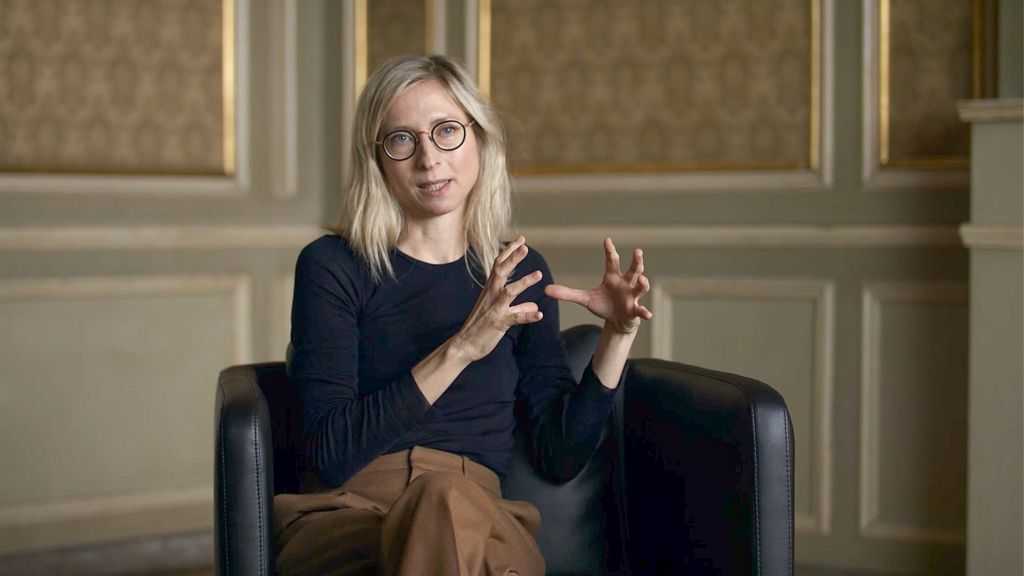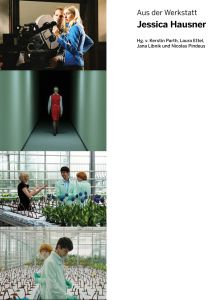“Découpage is my favourite playing field”
Film Academy Vienna has a new professor of directing: Jessica Hausner joined us to discuss her approach to the filmic medium and the emphases that she envisions for her teaching. This spring will see the release of a book on this filmmaker’s oeuvre as part of a series published by Film Academy Vienna.
Film Academy Vienna has succeeded in engaging Jessica Hausner as a directing professor for the coming two years. Hausner was a Film Academy Vienna directing student herself back in the 1990s, during which time she achieved her international breakthrough as part of the so-called nouvelle vague viennoise. The highlight of Hausner’s career to date has been her recent English-language debut Little Joe (2019), which was selected for screening in the main competition at the Cannes Film Festival and whose female lead received the Prix d’interprétation féminine.

To what extent can film directing actually be taught? And what would you like your students to end up take along for their futures?
Jessica Hausner (JH): In an artistic profession, it’s always about one’s personal perspective. So the thing that I can do as a teacher is stand by their side with both questions and advice. My point here is that it’s important for the students to find out for themselves what they want to say and how they can say it— ergo, it’s about developing their artistic personalities. I can provide help in uncovering the students’ own ideas and abilities, including their ability to question and assess their own work. So I view practising this sort of constructive criticism together with them as part of my job.
On what aspect of filmmaking would you like to put special emphasis in your teaching?
JH: I think it’s exciting to explore and expand the possibilities of filmic language. And the so-called breakdown, or découpage, is my favourite playing field. I like to explore the suggestive effects of visual language and editing, which is why I take inspiration from films by figures like Maya Deren or Lucrecia Martel. Both were trailblazers in terms of filmic language and employed innovative elements to powerful effect.
Style is of particular importance to me, so searching for a suitable tone in which a story can be told is something that I find essential. The naturalistic narrative style, even if it’s the prevalent one in cinematic film, is only one of many. And in this light, I think it’s interesting to also explore other styles with the students and to question the idea that film reproduces reality. This permits the notion that film gives rise to new realities. And the tone, the style, is crucial to what I take away from it as a viewer.
To what extent do your experiences from your student days at Film Academy Vienna represent an influence in terms of your new work as a directing professor?
JH: To the extent that Prof. Wolfgang Glück was the one who gave me a helpful bit of information. About my screenplay for Flora (1996), he said: “You have to like it. You have to know what you want to tell here, and you have to understand it. Not me.” He said this with such simple conviction that I fell silent and suddenly felt like I was once again in possession of that power of judgement which I’d almost ended up losing over the course of my studies. And immediately, I realised once more that all I really have are my own ideas—and that I’ll never be able to do justice to those of others, even if I want to. It was simultaneously a relief and a shock: I understood that I’m entirely responsible for what I do.
So to me, being a professor of directing means giving myself over to the students’ own worlds of ideas and continuing to develop these together with them.
What’s changed at Film Academy Vienna since your own student days?
JH: Today, there’s much more exchange and comparison going on, with more possibilities and more influences. Back in the 1990s, we were still a secluded backwater. Everyone did their own festival submissions themselves, by snail mail and accompanied by a landline phone call or an additional handwritten letter to the respective festival directors. And the decision-makers back then were exclusively male. So today, we’ve got more networking going on and also more women who make movies and get recognised internationally for it—they weren’t around back then, either. But with the easier access to information and content that digitisation entails, there’s also more pressure to compare yourself. And it may be the case that in those days, we initially spent more time flying under the radar.
How do you assess the situation faced by young film professionals in Austria today?
JH: In general, I think they have a good chance. There are film subsidies and efforts to make decisions in a balanced way. What’s more, we now have streaming platforms that need content and are partial to using young talent to create it. So it’s all the more important that you develop your own positions while still in film school. And that you figure out where you want to go and where not.

Kerstin Parth, Laura Ettel, Jana Libnik, Nicolas Pindeus (eds.)
Aus der Werkstatt: Jessica Hausner Sonderzahl 2021
Vol. 2 of a book series by Filmakademie Wien edited by Kerstin Parth and Claudia Walkensteiner-Preschl
Volume 2 of Aus der Werkstatt [From the Workshop] introduces Jessica Hausner, one of Austria’s most important cinematic auteurs. Hausner spoke at length with the editors about her entire filmic output—from her early short films at the Academy to her most recent movie Little Joe (2019), which garnered an award at the Cannes Film Festival. The series Aus der Werkstatt is based on oral history project of Film Academy Vienna’s Film and Media Studies division.

